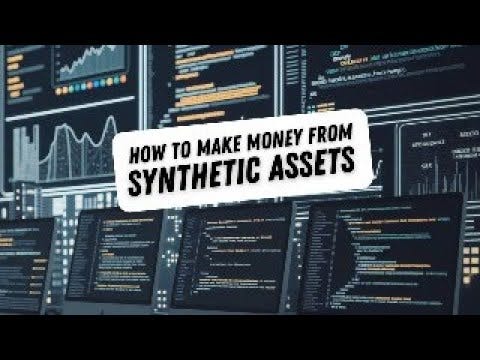How to Profit from Synthetic Assets on the Blockchain
A synthetic asset (synth) is a financial instrument that mirrors the value or price of an asset. Using synths you can profit from the price changes of an asset without actually owning the asset.
A synthetic asset (synth) is a financial instrument that mirrors the value or price of an asset. Using synths you can profit from the price changes of an asset without actually owning the asset.
Example: A gold synth lets you trade/invest in gold's price changes, without actually buying or storing physical gold. Synths can also relate to crypto and stock indexes.
Synthetic assets are created using blockchain smart contracts.
Here's how Synths work
Collateralization: First, you need collateral. This could be HYFI Tokens or stablecoins locked in a smart contract. The collateral acts as a security deposit to back the synth.
Price Feeds: Synths require correct price data from API services / oracles.
Minting: Synths are minted on the Blockchain using smart contracts.
Trading & Redemption: Synths can be traded on dexes or p2p networks. Synths can be redeemed by burning them and unlocking the collateral.
Here’s what makes synths great
Synths make it easy to invest in foreign stocks, cryptocurrency indexes, exotic commodities, and more.
Synths make it easy to buy small fractions of high-value assets.
Unlike traditional exchanges, synths run on the blockchain offering 24x7 trading.
Synths don't need storage, insurance, and other costs associated with tangible assets.
Synths offer leveraged investing which amplifies profits and losses!
Synths make it easy to hedge your real-world investments.
The risks to watch out for in synths are the volatility of the collateral, smart contract vulnerabilities, and Oracle / API manipulation.
Asset classes best suited for Synthetics
Bitcoin
Crypto Indexes
Equities, Stocks & Indexes
Industrial metals (Aluminium, Copper, Nickel, Zinc)
Movies, Music & TV shows
Oil & Natural Gas
Precious Metals (Gold, Silver, Platinum, Palladium)
Private Equity
Agricultural Commodities (Cocoa, Coffee, Cotton, Rice, Soybeans, Sugar, Wheat)
Real Estate
Venture Capital



